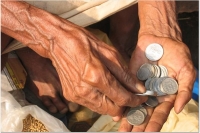 Suresh Menon, 60, retired recently after working in an automobile company. He has a son with a well-paid job and a married daughter, but the last thing Menon wants is to be dependent on them.
Suresh Menon, 60, retired recently after working in an automobile company. He has a son with a well-paid job and a married daughter, but the last thing Menon wants is to be dependent on them.
Menon owns a house in a posh locality in Bangalore, worth about Rs 80 lakh (Rs 8 million). But he has savings of only Rs 10 lakh or Rs 1 million (mostly in fixed deposits), not enough to ensure him an adequate post-retirement income.
Menon requires about Rs 20,000 a month to meet his needs, but earns only Rs 6,500 a month from his financial assets. And, the value of this amount will keep falling because of inflation. After five years, he will require about Rs 30,000 a month, while his financial assets will still generate only Rs 10,000 a month.
He was exploring the possibility of renting his house and moving to a smaller house himself or to sell his house altogether and invest the proceeds to earn a higher monthly income.
But in both situations, he will have to look about for accommodation after termination of the lease agreement every few months. Not a happy situation. As he was about to finalise one of the moves, he mentioned this to his retired banker-friend, Sudeep Shukla.
This reversed his thinking on the above options, as Shukla advised him to discuss a reverse mortgage with his ( Menon's) bank and it provedto be of great value to him.
A reverse mortgage enables a senior citizen i.e. above the age of 60 years, to avail of periodic payments from a lender against the mortgage of his/her house while remaining the owner and occupying the house.
He/she is not required to service the loan during his/her lifetime and therefore does not make monthly repayments of principal an interest to the lender. RMLs are extended by primary lending institutions, such as scheduled banks and housing finance companies registered with National Housing Bank.
The loan amount is dependent on the value of the property as assessed by the lender, age of the borrower(s) and prevalent interest rate. The loan can be provided through monthly/quarterly/half-yearly/annual disbursements or a lumpsum or as a committed line of credit or as a combination of the three.
As the name suggests, it is the reverse of the home loan mortgage, where you borrow money in a lumpsum at the beginning and then pay it back over a period of time.
In your payback in the form of the EMI (equated monthly instalment), a portion goes towards paying the interest and the remaining part towards paying back the principal.
During this process, you pledge the asset, the home you have bought with the loan, to the bank.
This asset is the security against which the bank is lending to you. In reverse mortgage, you pledge a property you already own (with no existing loan due on it). The bank then gives you a series of cash-flows for a fixed tenure. So, the role of EMI is reversed here.
How much of income can Menon's house generate using reverse mortgage? It depends on the interest rates the bank will use to determine the EMI. It may be assumed that it will not exceed the interest rates used for loans against property, currently in the region of 12-14 per cent.
The second important variable is the loan to value ratio. Most loans against property work at a 50-60 per cent loan to value ratio. That is, by pledging an Rs 80 lakh (Rs 8 million) property, he can get Rs 40-45 lakh (Rs 4 to Rs 4.5 million)loan. Some banks are, however, designing reverse mortgage products with a higher loan to value ratio, as much as 90 per cent in some cases.
The specific annuity paid out also depends on the age of the home owner. The higher the age, the higher the annuity, everything else being constant. The maximum period of the loan is 20 years.
So, if Menon opts for a 20-year reverse mortgage loan, he is likely to get about Rs 40,000 per month at an interest rate of about 12 per cent. This is enough to meet his retirement expenses and take care of inflation. What's more, the couple can continue to stay in the house during their lifetime.
After their demise, the bank can sell the house and use the proceeds to recover the outstanding amount.
The writer is Chief Editor, www.ApnaPaisa.com










 © 2025
© 2025